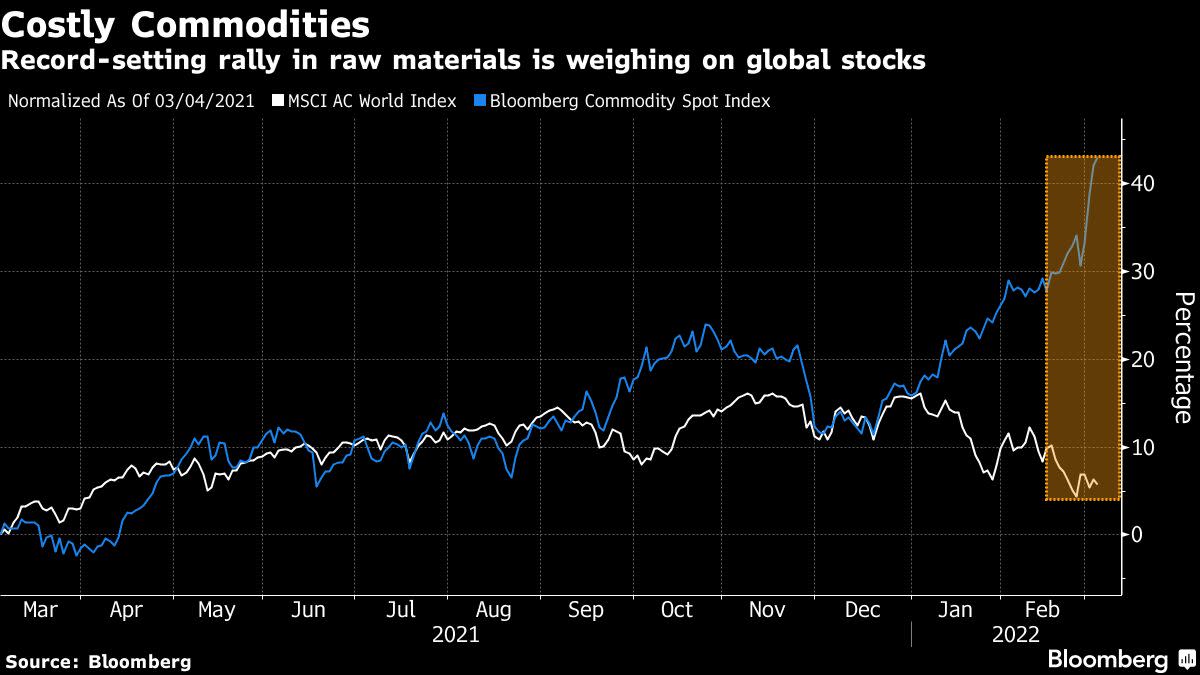Equity Futures Fall on Ukraine Nuclear Plant Drama: Markets Wrap

(Bloomberg) — Stocks fell Friday along with European and U.S. equity futures, while havens including sovereign bonds rose, as investors reacted to an attack on a major nuclear power plant in Ukraine by Russian troops.
Most Read from Bloomberg
European contracts fell about 3% and those for the U.S. shed around 1%, a little off earlier lows after an initial spasm of worry eased. Asian equities were in the red, sapped by Japan and Hong Kong.
Ukraine told the International Atomic Energy Agency that a fire at the plant “has not affected ‘essential’ equipment” and that there had been no change reported in radiation levels.
Gains in gold and the dollar moderated, while the euro pared a decline. Oil was near $110 a barrel, trimming a jump of as much as 4.8%. A rally in Treasuries lowered the U.S. 10-year yield to less than 1.80%.
Russian troops began shelling the facility — Europe’s largest nuclear plant — on Friday, Ukrainian officials said.
Sentiment was already shaky after Russia’s invasion of its neighbor and transformation into a pariah in the global economy. Energy, metal and grain costs have soared as Russia’s oil and other resources are shunned.
“The headlines about the Russian shelling of that nuclear plant are clearly driving a flight to quality trade,” said Chamath de Silva, senior portfolio manager at BetaShares Holdings in Sydney.
Russia’s military action and sanctions imposed by the U.S. and its allies are creating a range of risks. They include high raw material costs, damage to global confidence that can sap investment and the potential for credit stress to ripple through markets.
The gap between two-year and 10-year U.S. Treasury yields is the lowest since March 2020. The flatter curve points to expectations for slowing economic expansion.
“Rising commodity prices are a big concern for the market, prompting fears of stagflation,” said Fiona Cincotta, senior financial markets analyst at City Index. “The economic clinch point of this war is commodity prices. Higher energy prices, slowing growth, and surging inflation are not a good outlook.”
Traders are also evaluating the monetary policy outlook and awaiting the key monthly U.S. employment report.
Chair Jerome Powell on Thursday reaffirmed that the Federal Reserve is set to start a series of interest-rate hikes to curb inflation, while indicating it will move judiciously and is alert to inflation risks.
What to watch this week:
Some of the main moves in markets:
Stocks
-
S&P 500 futures fell 0.8% as of 12:38 p.m. in Tokyo. The S&P 500 fell 0.5%
-
Nasdaq 100 futures slid 0.8%. The Nasdaq 100 fell 1.5%
-
Japan’s Topix index fell 1.9%
-
South Korea’s Kospi index lost 1.2%
-
Australia’s S&P/ASX 200 index dropped 0.8%
-
Hong Kong’s Hang Seng index fell 2.5%
-
China’s Shanghai Composite index shed 0.6%
-
Euro Stoxx 50 futures decreased 2.6%
Currencies
-
The Bloomberg Dollar Spot Index rose 0.1%
-
The euro was at $1.1029, down 0.3%
-
The Japanese yen was at 115.35 per dollar, up 0.1%
-
The offshore yuan was at 6.3236 per dollar
Bonds
-
The yield on 10-year Treasuries declined seven basis points to 1.77%
-
Australia’s 10-year bond yield was at 2.14%, down three basis points
Commodities
-
West Texas Intermediate crude rose 1.9% to $109.68 a barrel
-
Gold was at $1,940.04 an ounce, up 0.2%
Most Read from Bloomberg Businessweek
©2022 Bloomberg L.P.




